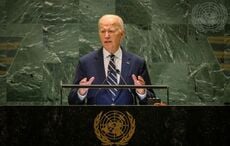“The Irish actually enjoy suffering,” according to famed financial journalist Michael Lewis, who has written several of the best selling financial books of this era including “Liar’s Poker,” “Moneyball” and “The Big Short.”
Speaking on CNBC’s “Power Lunch”, the author discussed his latest feature story on Ireland’s downfall, which is due to appear in the March edition of “Vanity Fair” magazine.
Discussing the Irish taxpayer, Lewis said he was surprised by how much the Irish have had to endure.
“It’s incredible what they have put up with. The casual observer, as I was as I traveled through Ireland, was that the Irish actually enjoy suffering. They have gone out of their way to suffer and they have put up with an extraordinary amount,” Lewis said.
“The problem with the Irish is that you can push them and push them and push them and they will take it and take it, and one day they will snap and go wacko on you and that seems to be what has happened in Ireland.
“I think eventually they will have no choice but to default on their debt, but it won’t be called a default. It will be called something much more polite than that, like a restructuring.”
A prominent writer on the worldwide financial crisis, Lewis travelled to Ireland and met with Finance Minister Brian Lenihan as well as other politicians and bankers for his feature “When Irish Eyes Are Crying.”
“In an era when capitalists went out of their way to destroy capitalism,” he writes, “the Irish bankers set some kind of record for destruction.”
The journalist was astounded when the Irish government hired Merrill Lynch as a consultancy firm for advice.
“The story was incredible. There was a research analyst called Phillip Ingram in Merrill Lynch’s London office who wrote a report saying basically that the Irish banks were the most irresponsible lenders in the British property market…Merrill Lynch retracted the statement within 24 hours under pressure from the Irish banks and fired him. And then Merill Lynch was brought in to advise the Irish government what to do, when the crisis hits,” Lewis told CNBC.
The journalist told Vanity Fair Daily that he found Irish people have a real interest in what the rest of the world is thinking.
“The Irish are really charming in their interest in what foreigners have to say about them. In contrast, the Greeks aren’t actually all that interested in what foreigners have to say about them. The Irish care too much about what others think of them, and the Greeks too little, and you can see both traits in the way they’ve handled their financial affairs,” he says.
Speaking about the future of Irish politics, Lewis expects serious change over the coming years.
“I think Irish politics is going to undergo convulsions in the next few years. This is a really different situation than the past Irish crises. First, people are losing things they thought were rightfully theirs; there is a collapse in the standard of living that people had become a bit accustomed to,” said Lewis.
“Second, historically in Ireland, when there are these types of crises, the pressure valve is immigration; people go other places. Historically, they come here and they can’t anymore. We don’t let them in. In fact, we throw them out if we find them without green cards.
“They’re kind of stuck where they are, and I think that’s going to cause lots of turmoil,” he concluded.




Comments